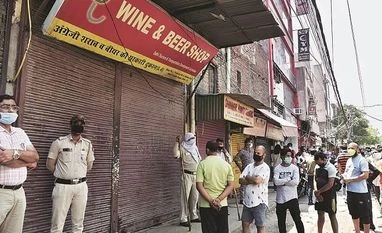With finances taking a hit because of the lockdown, states are scrambling to tap revenue streams like liquor and petroleum. For instance, the Andhra Pradesh government will hold a meeting on Wednesday to discuss imposing a higher tax on fuel, registration of cars, after increasing prices of liquor by another 50 per cent on Tuesday, a state official told Business Standard.
The move on liquor came a day after it imposed a 25 per cent hike on the product. The other options on the table for Andhra Pradesh are hiking municipal taxes, local panchayat cess and increasing fee on registration of properties, the official added.
Similarly, Punjab on Tuesday announced a hike in petrol and diesel prices by Rs 2 a litre each. It will also will hold a Cabinet meeting on Wednesday to consider revenue augmenting measures, including a duty hike in liquor and vehicle registration fee.
“These unpopular measures will be needed in these tough times,” said a Punjab government official.
The Delhi government has already imposed a Covid cess of 70 per cent on liquor and hiked petrol and diesel prices as the state got just Rs 300 crore in April, almost a twelfth of what was earned the same month last year.
West Bengal Finance Minister Amit Mitra said the state received 13 per cent of the normal revenue collected in April. This was despite the hike in value-added tax on fuel by the state government in April. Other states might have done even worse, he said.
“In May, this 13 per cent may fall to 5-6 per cent. In April, we collected some revenue, whereas in May it will be worse. Green zones do not have industry in most states. In May, exports have been frozen, whereas in April some exports happened,” he said.
People outside a liquor shop at Chander Nagar in East Delhi.
Kerala Governor Arif Mohammad Khan recently signed an ordinance —Kerala Disaster and Public Health Emergency Special Provisions Act, 2020 — ushering in a law to defer up to 25 per cent of salaries of state government employees for six months during an emergency. The state expects to save Rs 2,500 crore through this move.
The Maharashtra government has already announced a 67 per cent reduction in developmental schemes and a freeze on new capital works in the current financial year. The state is the worst hit by the pandemic.
It has asked departments to cap spending in the first quarter to 25 per cent of budgeted estimates so that expenditure on committed heads, including salaries, wages, pensions, interest payments can be met. The committed expenditure on these is pegged at Rs 1.91 trillion, constituting 44 per cent of total expenditure of Rs 4.34 trillion during FY21.
The state projected its own tax revenues (OTR) to rise 12.8 per cent in FY21 year-on-year (YoY). At around Rs 2.25 trillion, projected for the year, OTR comes to about Rs 18,750 crore a month. It is this revenue that will bear the brunt of the lockdown. For the year as a whole, OTRs include sales tax and VAT at Rs 40,000 crore, stamp duty and registration fee at Rs 30,000 crore and state excise duty at Rs 19,225 crore. The state also announced a VAT hike on fuels in April.
However, the bulk of the revenue is projected to come from state GST at Rs 1.07 trillion, which was 24 per cent higher than revised estimates for FY20. This growth is unlikely to be met.
The same is the condition of other states. For instance, Mitra said with GST collections down, which makes up for the bulk of state revenues, property registrations were also not taking place, so no stamp duties were being collected. The state has projected stamp duty and registration fee at Rs 6,872 crore out of total OTR of Rs 70,807 crore. GST was pegged at Rs 33,153 crore.
Of the states mentioned above, Kerala might see some real shock as it projected its OTR to rise 21 per cent in FY21. Of this, state GST was pegged to rise 36.7 per cent, which seems a challenge now.
Its ordinance deferring salaries would give it some support. These were pegged at around Rs 54,000 crore, constituting 37 per cent of the total expenditure of Rs 1.44 trillion for FY21.
Punjab expected its overall revenues to fall 2.2 per cent this financial year even as it projected OTR to rise 6.2 per cent. Within OTR, it expected GST to rise 18 per cent.
Of the states mentioned, only Delhi has a fiscal surplus at Rs 523 crore, according to the revised estimates for FY20, which is expected to give way to a deficit of Rs 5,080 crore in the current financial year. But, with revenues of only Rs 300 crore coming in in April, this deficit is expected to widen further. This is despite imposition of Covid cess on liquor by the state. Other states, including Andhra Pradesh followed suit.
Rajat Bose, partner, Shardul Amarchand Mangaldas & Co, said: “Following the footsteps of Delhi, other states have started increasing tax on liquor. This is a low hanging fruit at the moment for state governments to garner revenue which have otherwise dried up in light of the economic lockdown.”


Unlock 30+ premium stories daily hand-picked by our editors, across devices on browser and app.
Pick your favourite companies, get a daily email with all news updates on them.
Full access to our intuitive epaper - clip, save, share articles from any device; newspaper archives from 2006.
Preferential invites to Business Standard events.
Curated newsletters on markets, personal finance, policy & politics, start-ups, technology, and more.



)